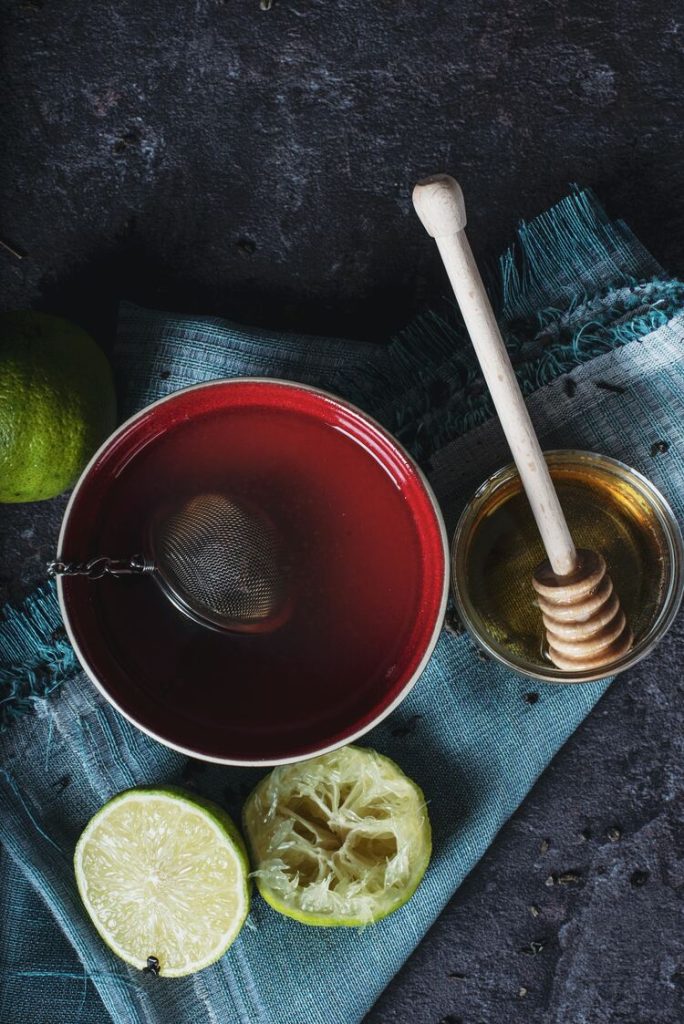I absolutely adore citrus teas!
I usually sip them all day long. It is my way to stay hydrated. The great thing is that they can be enjoyed hot or cold and are perfect for any time of day. Not only do citrus teas taste great, but they also offer a range of health benefits.
This article discusses blends, preparation methods, health benefits, and much more!
Please note: This article contains affiliate links, meaning I may earn a commission if you make a purchase by clicking a link. Of course, this comes at no extra cost to you and helps me keep offering readers solid information.

Citrus Teas Overview
Citrus teas are created by infusing citrus fruits, or their components, into tea.
The process typically involves selecting a tea base, citrus, and infusion method.
Common tea bases include black, green, white, or herbal tea. For the citrus fruits, lemons, oranges, limes, or grapefruits are popular choices. Each type of tea will interact differently with the citrus. Therefore, there is room for tasting different combinations.
As for the infusion methods, the combination of tea and citrus can be brewed with hot or cold water. As we know, heat helps to extract the ingredients’ flavors. In the case of the cold infusion, the flavors are released slowly, resulting in a milder and smoother taste.
Pure citrus teas (without a base) can be enjoyed as well.
We discuss different tea ingredients in the following sections.
Types of Citrus Used
We will start by discussing the most popular citrus fruit options. After all, they are the stars of this type of tea.
Lemon
Lemon is one of the most popular ingredients in citrus teas since it has a bright, tangy flavor that is perfect for waking or refreshing you in the afternoon.
Orange
Orange is another popular ingredient used in citrus blends. Oranges have a natural, satisfying sweetness. Therefore, they are a healthy option to satisfy cravings without adding sugar or artificial ingredients.
Lime
Lime is known for its tangy and slightly bitter taste. Lime tea or lime-infused tea is often enjoyed in tropical regions as it complements the climate and cuisine. It pairs well with a hint of sweetness from honey or a touch of mint for added freshness.
Grapefruit
Grapefruit is a less common ingredient in teas but equally delightful. It can be enjoyed independently or blended with other citrus fruits to create a balanced medley. It can be served with a touch of honey to tone down the tartiness.
Bergamot
Bergamot is a unique ingredient used in teas. This fruit is a cross between a lemon and an orange. It has a distinct flavor that is both sweet and sour. Bergamot is often used to make Earl Grey tea, a popular black tea flavored with bergamot oil.
Mandarin
You may have noticed mandarins have their particular flavor. That lovely flavor lends a refreshing twist to tea. Mandarin-infused tea is prevalent in winter, as mandarins are often associated with celebrations. They are sometimes paired with spices like cinnamon or cloves for warmth and depth.
Yuzu
Yuzu tea originates from Japan and is made from the yuzu, a citrus fruit with a distinctive flavor profile that combines elements of lemon, lime, and grapefruit.
To create a sweet and tangy syrup, Yuzu tea is typically prepared by boiling yuzu fruit slices with honey or sugar. The syrup is then mixed with hot water to make a fragrant tea. Yuzu tea is enjoyed for its bright flavor and is often consumed during the winter to ward off colds and boost the immune system.
Pomelo
A pomelo is a large citrus fruit similar to grapefruit but milder and sweeter in flavor. Pomelo tea can be made by infusing pomelo peels or slices with tea leaves or using dried pomelo segments. It offers a subtly sweet and tangy flavor profile, and the resulting tea is often light and refreshing.
Calamansi
Calamansi tea is popular in Southeast Asia, especially in the Philippines. It is made from calamansi, a small citrus fruit similar to a lime or mandarin orange. The calamansi fruit is squeezed or juiced and added to hot or cold tea, creating a tart beverage.
Mixed Citrus
Many tea companies offer a blend of different citrus fruits. It’s a great way to enjoy the flavors and benefits of other fruits in one cup.
It’s worth noting that the intensity of the citrus flavor in teas can vary depending on factors such as the amount of citrus used, the tea base, and the infusion time.

Types of Tea Leaves Used
We mentioned you can prepare teas exclusively with citrus fruits. To do that, you should know the options based on the previous section.
If you want to go further, you can combine citrus with a true or herbal tea base. Here are some of the most common types of tea leaves used in citrus teas:
Black Tea
Black tea is a popular base for citrus teas due to its robust flavor and ability to hold up against the strong citrus notes. The combination of black tea and citrus creates a bold, refreshing taste that is perfect for jumpstarting your day.
White Tea
White tea is a more delicate tea that pairs well with lighter citrus flavors. The subtle notes of white tea allow the citrus to shine through without overpowering the tea. This combination creates a refreshing, light taste ideal for a hot summer day.
Green Tea
Green tea is another popular base for citrus teas. Green tea’s light and fresh taste pairs well with citrus’s bright and zesty flavors.
Rooibos Tea
Rooibos tea (or red tea) is a caffeine-free tea. It is a good option for those who want to enjoy a citrus-infused tea without the jitters. The naturally sweet and nutty flavor of rooibos tea pairs well with the tartness of citrus, creating an enjoyable taste.
Hibiscus Tea
Hibiscus tea is a tart and tangy tea that pairs well with citrus. The combination creates a bold and fruity taste that can be enjoyed on a hot day.
Chamomile Tea
Chamomile tea is known for its soothing properties. The combination with citrus creates a relaxing beverage ideal for winding down after a long day.
Mint Tea
The refreshing flavors of mint tea pair well with citrus’s bright and zesty flavors. The combination creates a cooling and invigorating taste.
How to Prepare Citrus Teas
Now that we have discussed the different types of fruits and leaves that can be used and/or mixed in citrus teas, it is time to explore different preparation methods.
Using Fresh Citrus
Preparing citrus tea with fresh citrus is easy. Start by washing your citrus fruit thoroughly and slicing it into thin rounds. Bring a pot of water to a boil and add the citrus slices. Let the citrus boil for 5-10 minutes or until the water becomes fragrant. Remove the pot from the heat and let it cool for a few minutes before straining the tea.
Using Dried Citrus Peels
Dried citrus peels are a great way to add citrus flavor to your tea. To prepare a tea with dried citrus peels, start by adding the peels to a pot of boiling water. Let the peels boil for 5-10 minutes or until the water becomes fragrant. Remove the pot from the heat and let it cool for a few minutes before straining the tea. You can also use a tea infuser to hold the dried peels while the tea steeps.
Combining with Other Ingredients
You have several options to infuse true or herbal teas with citrus notes.
You can buy a ready-to-use blend from a tea manufacturer. The blend may come in loose-leaf or bag form. Or, you can buy the leaves by themselves and infuse them with fresh or dried fruit.
Following instructions when brewing true teas (black, green, white) is important. These are prepared by pouring hot water over the leaves and letting them steep for a short, specific time. Overstepping or using boiling water (too hot) may produce bitter tea.
When infused with citrus, combine the leaves with fresh or dried fruit and pay attention to brewing instructions.
Herbal teas are more forgiving, but I also recommend reading brewing instructions.
Adding Sweeteners and Spices
Citrus tea can be enjoyed as is, but adding sweeteners and spices can enhance the flavors. Honey is a great natural sweetener. You can also add sugar or other sweeteners to taste. Cinnamon, ginger, and cardamom can add warmth and depth to your tea. Experiment with different combinations to find your favorite flavor.
Iced Citrus Teas
Nothing beats a refreshing glass of iced tea when the weather’s hot and you need to cool down. And, when you add citrus flavors to the mix, things get even more flavorful.
Here are some tips for making the perfect iced citrus tea:
- Brew your tea as usual, using twice the amount of tea leaves or tea bags you would use for a hot cup of tea. This will ensure the tea is strong enough to withstand the ice and the citrus flavors.
- While the tea is still hot, add some freshly squeezed citrus juice to it. You can add some zest or slices of citrus fruits to the tea to infuse it with more flavor.
- Let the tea cool down to room temperature, then refrigerate it until it’s cold.
- To serve, fill a glass with ice cubes and pour the cold tea over them. You can add more slices of citrus fruits or fresh mint leaves for garnishment.

Health Benefits of Citrus Teas
Here are some health benefits associated with citrus-flavored teas:
Vitamin C and Antioxidants
Citrus teas are a great source of vitamin C and antioxidants. They can help to meet your daily needs for this vitamin. Vitamin C helps boost your immune system, while antioxidants help protect your cells from damage caused by free radicals.
Anti-inflammatory and Anticancer Properties
Citrus fruits like oranges and lemons contain compounds like limonene and hesperidin, which have been shown to have anti-inflammatory and anticancer properties.
Blood Sugar and Cholesterol Control
Studies have shown that compounds in citrus fruits like bergamot and grapefruit can help lower blood sugar and cholesterol levels.
Buying Recommendations
We have several recommendations if you want to experiment with citrus teas or citrus-infused teas at home (see below).
Remember, quality is key. When looking for a base for the tea, consider whole leaves instead of broken or crushed leaves, as they tend to have a richer flavor. Leaves labeled “first flush” (the season’s first harvest) tend to be of higher quality.
A balanced flavor is ideal when looking for blends, with neither the tea nor the citrus overpowering the other.
TAZO Tea Bags, Wild Sweet Orange Unsweetened Herbal Tea

Twinings Unwind Herbal Tea, Honeybush, Mandarin & Orange

Organic Citrus Bergamot Earl Grey Tea

Happy Belly Citrus Green Tea Bags

Frequently Asked Questions
What are the health benefits of fruit teas?
Fruit teas, including citrus teas, are known for their high antioxidant content. Antioxidants help fight free radicals in the body, which can cause damage to cells and contribute to chronic diseases. Citrus teas are also a good source of vitamin C, which is essential for a healthy immune system. Some citrus teas may also have anti-inflammatory properties and can aid digestion.
Can citrus teas be made with fresh fruit?
Yes, citrus teas can be made with fresh fruit. Simply slice the fruit and add it to your tea infuser along with your tea leaves. Citrus fruits like lemons and oranges are commonly used in tea, but you can also experiment with other fruits like grapefruit or lime.
How do you make herbal lemon tea?
To make herbal lemon tea, boil water and add your herbal tea bag to a cup. Slice a lemon and add a few slices to the cup. Let the tea steep for 3-5 minutes, then remove the tea bag and lemon slices. You can add honey or sweetener to taste.
What are some common uses for citric acid in tea?
Citric acid is often added to tea as a natural preservative and flavor enhancer. It can also be used to adjust the pH level of the tea, which can affect the taste and color. Some people also use citric acid to make their tea taste more tart or sour, similar to citrus fruits. However, it is important to use citric acid in moderation, as too much can cause a sour or bitter taste.

I hope you have enjoyed the article and learned something new!
What is your favorite citrus tea?
More About Tea
The Process of Making Black Tea